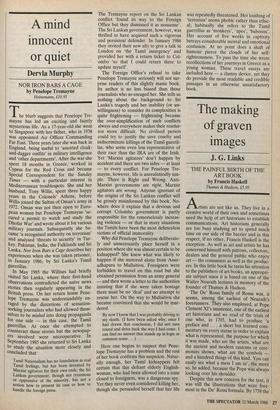A mind innocent or quiet
Deryla Murphy
NOR IRON BARS A CAGE by Penelope Tremayne
Heinemann, £10.95
The blurb suggests that Penelope Tre- mayne has led an exciting and faintly mysterious life. As a 17-year-old she went to Singapore with her father, who in 1938 was appointed Air Officer Commanding Far East. Three years later she was back in England, being useful to 'assorted cloak- and-dagger outfits' in military intelligence and 'other departments'. After the war she spent 18 months in Greece, worked in Cyprus for the Red Cross and became Special Correspondent for the Sunday Times — with a particular interest in Mediterranean troublespots. She and her husband, Tony Willis, spent three happy years in the Colonels' Athens, before Willis joined the Sultan of Oman's army in 1972. Oman was not then open to Euro- pean women but Penelope Tremayne 'se- cured a permit to watch and study the Dhofar War' and wrote about it for various military journals. Subsequently she be- came `a recognised authority on terrorism' and analysed 'threats to security' in Tur- key, Pakistan, India, the Falklands and Sri Lanka. Nor Iron Bars a Cage describes her experiences when she was taken prisoner, in January 1986, by Sri Lanka's Tamil guerrillas.
. In May 1985 the Willises had briefly visited Sri Lanka, where their first-hand observations contradicted the naive news stories then regularly appearing in the British press. On her return home Pene- lope Tremayne was understandably en- raged by the distortions of sensation- seeking journalists who had allowed them- selves to be misled into doing propaganda for one side — in this case, the Tamil guerrillas. At once she attempted to counteract these stories but the newspap- ers involved were uncooperative. In September 1985 she returned to Sri Lanka to study the situation more closely and concluded that
Tamil Nationalism has no foundation in real Tanail feelings, but has been invented by Marxist agitators for their own ends; the Sri Lankan government, though not tyrannous or oppressive of the minority, has not a notion how to present its case or how to handle the foreign press.
The Tremayne report on the Sri Lankan conflict `found its way to the Foreign Office but they dismissed it as nonsense'. The Sri Lankan government, however, was thrilled to have acquired such a vigorous and persistent defender. In January 1986 they invited their new ally to give a talk in London on 'the Tamil insurgency' and provided her with a return ticket to Col- ombo `so that I could return there to update myself.
The Foreign Office's refusal to take Penelope Tremayne seriously will not sur- prise readers of this slightly manic book. Its author is no less biased than those journalists who so enraged her. She tells us nothing about the background to Sri Lanka's tragedy and her inability (or un- willingness) to consider its complexities is quite frightening — frightening because the over-simplification of such conflicts always and everywhere makes their resolut- ion more difficult. No civilised person could try to justify the save cruelty and indiscriminate killings of the Tamil guerril- las, who seem even less representative of their race than the IRA are of the Irish. Yet 'Marxist agitators' don't happen by accident and there are two sides — at least — to every conflict. For Penelope Tre- mayne, however, life is unrealistically sim- ple. There is Right and Wrong. Anti- Marxist governments are right, Marxist agitators are wrong. Anyone ignorant of the origins of the Sri Lankan conflict will be grossly misinformed by this book. No- where does it explain that a devious and corrupt Colombo government is partly responsible for the remorselessly increas- ing violence — or that in many situations the Tamils have been the most defenceless victims of official immorality.
Why did Penelope Tremayne deliberate- ly and unnecessarily place herself in a position where she was almost certain to be kidnapped? She knew what was likely to happen if she motored alone from Anur- adhapura to Mullaitivu. Foreigners were forbidden to travel on this road but she obtained permission from an army general — and then wrote a letter to the authorities insisting that if she were taken hostage there must be no 'deal' and no attempt to rescue her. On the way to Mullaitivu she became convinced that she would be mur- dered.
By now I knew that I was probably driving to my death. (I have been asked why, once I had drawn that conclusion, I did not turn round and drive back the way I had come. I can find no answer that stands up in logic or common sense. . .)
Here one begins to suspect that Pene- lope Tremayne has a problem and the rest of her book confirms this suspicion. Natur- ally enough, her Tamil kidnappers felt certain that this defiant elderly English- woman, who had been allowed into a zone closed to foreigners, was a dangerous spy. Yet they never even considered killing her, though she persuaded herself that her life was repeatedly threatened. Her loathing of 'terrorists' seems phobic rather than ethic- al; habitually she refers to the Tamil guerrillas as 'monkeys', 'apes', 'baboons'. Her account of five weeks in captivity betrays considerable mental and emotional confusion. At no point does a shaft of humour pierce the clouds of her self- righteousness. To pass the time she wrote recollections of her journeys in Greece as a young woman. These travel essays are included here — a clumsy device, yet they do provide the most readable and credible passages in an otherwise unsatisfactory book.


















































 Previous page
Previous page